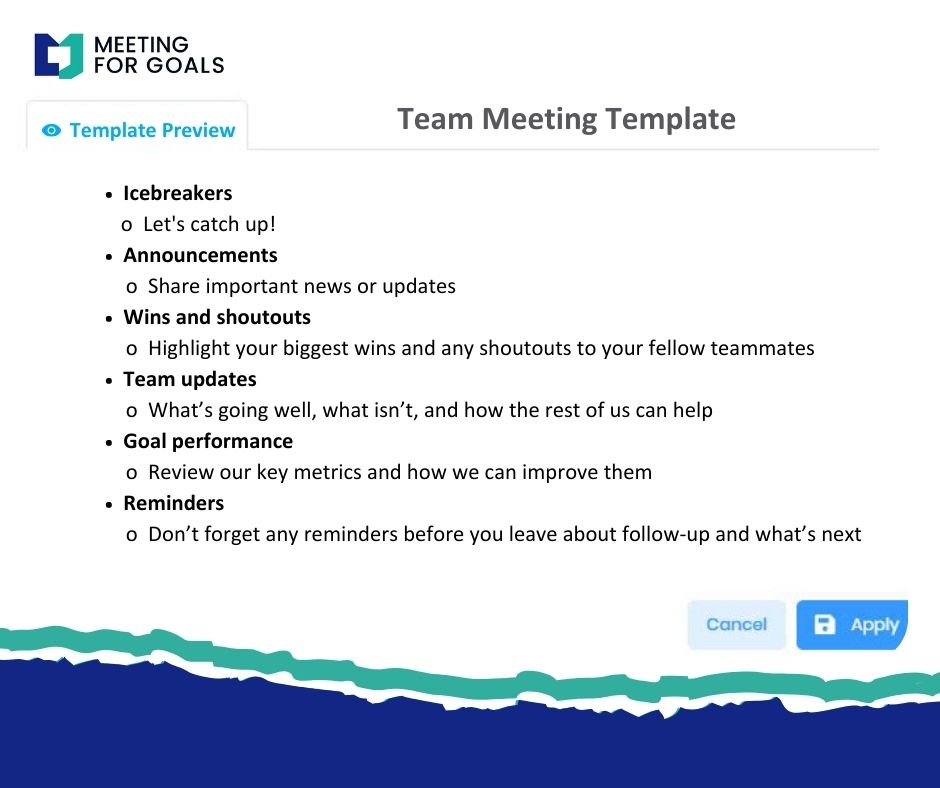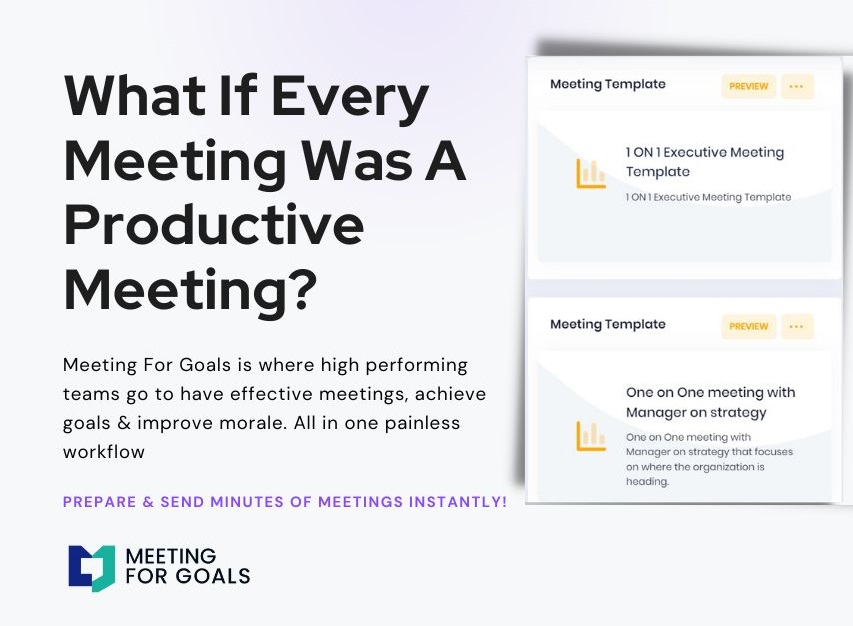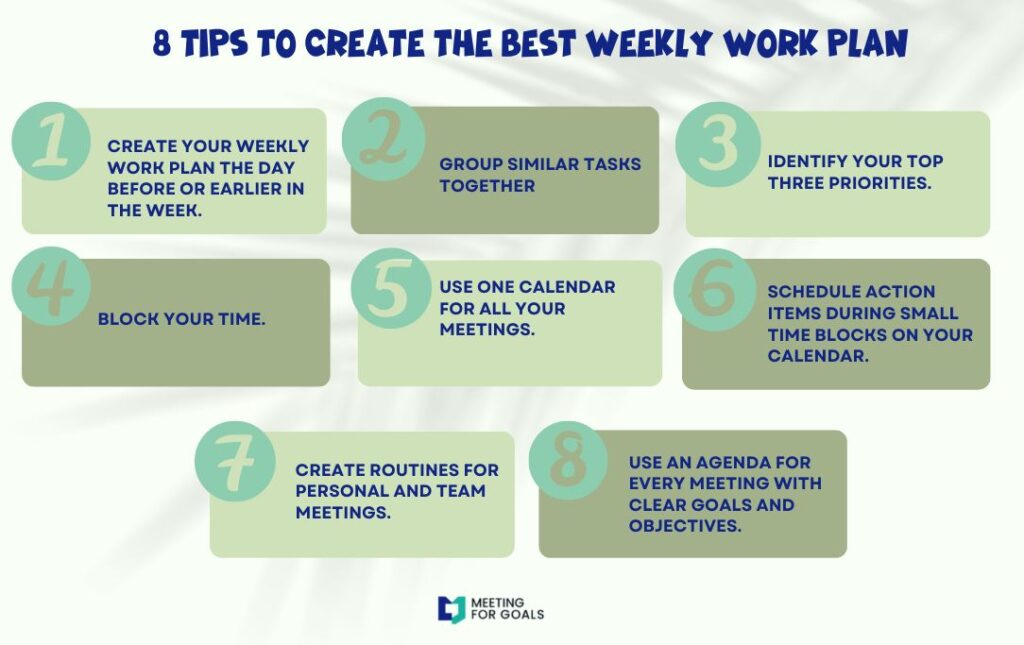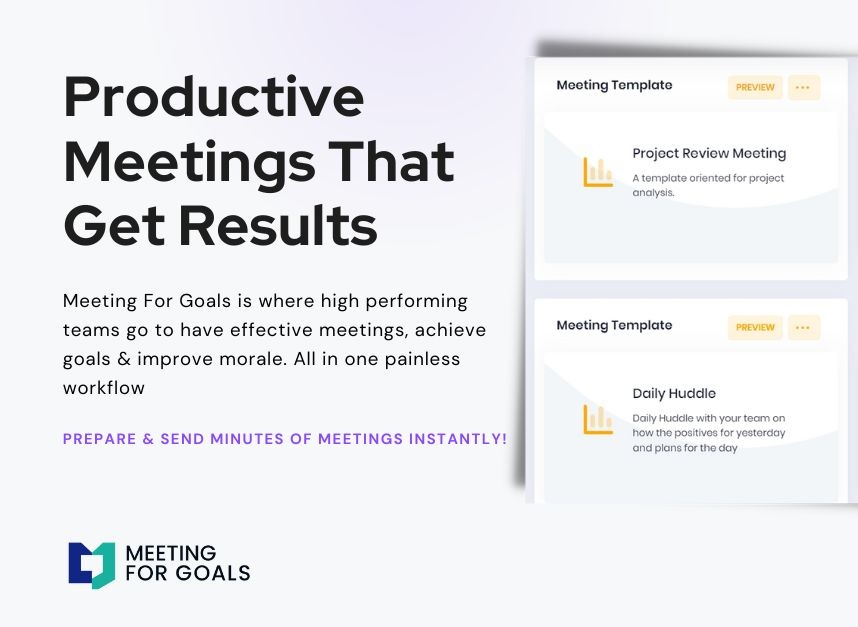Build Rapport Questions: How to Strengthen Team Connections in Meetings
Meetings are the heartbeat of collaboration in any organization. Yet, many teams struggle with disengagement, lack of participation, and ineffective discussions that waste valuable time. One of the simplest yet most powerful ways to improve meeting effectiveness is by building rapport among team members.
Rapport is the foundation of strong professional relationships. When employees feel connected to their colleagues, they communicate more openly, share ideas freely, and collaborate more effectively. This is especially important for companies with 40-70 employees, where cross-functional teamwork is key to success.
Meeting For Goals helps high-performing teams run more productive meetings by aligning discussions with company goals, improving accountability, and fostering engagement. By incorporating rapport-building questions into your meeting strategy, you can create a more inclusive, dynamic, and results-driven team environment.
In this blog, we’ll explore:
- Why rapport is crucial in the workplace.
- The types of questions that help build connections.
- Strategies for integrating these questions into meetings.
- How Meeting For Goals can enhance team engagement.
By the end of this article, you’ll have actionable insights to transform your meetings into engaging, goal-oriented discussions that strengthen team relationships.
2 Minute Video
Watch a 2 minute demo of our meeting management software in action
II. Understanding Rapport in the Workplace
What Is Rapport and Why Does It Matter?
Rapport is the connection and mutual understanding between individuals. In the workplace, this means trust, respect, and open communication—all essential for a high-performing team.
When team members have strong rapport, they:
- Feel comfortable sharing ideas and feedback.
- Collaborate more effectively on projects.
- Experience higher job satisfaction and engagement.
- Are more likely to contribute to problem-solving and innovation.
The Impact of Rapport on Productivity and Communication
A lack of rapport can lead to miscommunication, disengagement, and low morale—all of which hurt productivity. On the other hand, teams with strong rapport experience:
- Better teamwork – Employees work together more efficiently.
- Stronger alignment with company goals – When people feel valued, they are more invested in the company’s success.
- Higher retention rates – Employees who feel connected to their colleagues are less likely to leave.
According to a study by Gallup, engaged employees are 21% more productive than their disengaged counterparts. This highlights the direct impact of team connection on overall performance.
How Rapport Affects Meeting Success
Meetings are where critical decisions are made, but without rapport, discussions can feel forced, unproductive, or dominated by a few voices. By fostering rapport, meetings become:
- More engaging – Team members actively participate.
- More efficient – Open communication reduces misunderstandings.
- More results-driven – A connected team is more likely to take ownership of tasks and follow through.
Building rapport isn’t just a “nice-to-have” in the workplace—it’s a necessity for successful collaboration and business growth.
Adding an Agenda
How to add an agenda instantly on Meeting For Goals
III. Key Rapport-Building Questions
Types of Questions That Foster Connection
Asking the right questions during meetings helps break the ice, deepen relationships, and align team members toward shared goals. Here are three types of rapport-building questions:
1. Icebreaker Questions
These light, engaging questions help team members feel comfortable. Examples include:
- “What’s one fun fact about you that most people don’t know?”
- “If you could have dinner with any historical figure, who would it be?”
- “What’s the best piece of advice you’ve ever received?”
2. Personal Interest Questions
These questions help team members learn more about each other’s backgrounds, hobbies, and motivations. Examples include:
- “What’s a hobby or skill you’re currently working on?”
- “What inspired you to pursue your current career path?”
- “If you weren’t in this profession, what would you be doing?”
3. Goal-Oriented Questions
These questions encourage individuals to reflect on their aspirations and align their efforts with team objectives. Examples include:
- “What’s one professional goal you’re working towards this year?”
- “How can the team better support you in achieving your goals?”
- “What’s one improvement you’d like to see in our team’s collaboration?”
How to Use These Questions Effectively
- Start meetings with an icebreaker to set a positive tone.
- Use personal interest questions in one-on-one meetings to build deeper connections.
- Incorporate goal-oriented questions in team discussions to drive alignment and accountability.
By strategically integrating these questions, you create a more engaged and connected team.
IV. Techniques to Introduce Rapport-Building Questions in Meetings
1. Integrating Questions into Meeting Agendas
To make rapport-building a consistent practice, include a dedicated time slot for these questions in your meeting agenda. This ensures they become a natural part of the discussion rather than an afterthought.
Looking for ready-to-use meeting templates? Check out our free meeting templates to structure your discussions effectively.
2. Timing and Placement for Maximum Impact
- Start with an icebreaker to create a relaxed atmosphere.
- Use personal interest questions in team check-ins or informal discussions.
- End with goal-oriented questions to reinforce accountability and motivation.
3. Encouraging Participation and Open Dialogue
- Foster a safe space where team members feel comfortable sharing.
- Rotate who asks the questions to increase engagement.
- Use tools like Meeting For Goals to track responses and build on previous discussions.
By embedding these strategies into your meeting culture, you create an environment where trust and collaboration thrive.
V. Leveraging Meeting For Goals for Enhanced Rapport
1. Features That Support Rapport-Building
Meeting For Goals offers several features that help teams foster rapport, including:
- Structured agendas that incorporate rapport-building questions.
- Meeting insights tracking to understand team dynamics.
- Feedback tools to continuously improve meeting effectiveness.
2. Tracking Team Member Insights and Preferences
With Meeting For Goals, you can:
- Keep a record of team members’ interests, strengths, and goals.
- Use past discussions to tailor future meetings for better engagement.
3. Continuous Improvement Through Feedback
By analyzing meeting data, leaders can:
- Identify areas where team connections need strengthening.
- Adjust meeting formats to enhance participation.
- Ensure meetings remain goal-driven and productive.
With Meeting For Goals, rapport-building becomes an intentional and measurable part of your team’s success.
VI. Conclusion
Building rapport isn’t just about making meetings more enjoyable—it’s about creating a high-performing, aligned, and engaged team. By integrating rapport-building questions, leaders can foster better communication, stronger collaboration, and greater productivity.
Key Takeaways:
✅ Rapport is essential for effective teamwork and meeting success.
✅ Asking the right questions enhances team connections.
✅ Structuring meetings with Meeting For Goals ensures consistency and impact.
As a high-level executive, you have the power to transform your meetings from routine discussions into dynamic, goal-oriented conversations. Start leveraging rapport-building questions today and experience the difference in team engagement and productivity.
Want to take your meetings to the next level? Try Meeting For Goals and make every meeting count! 🚀




